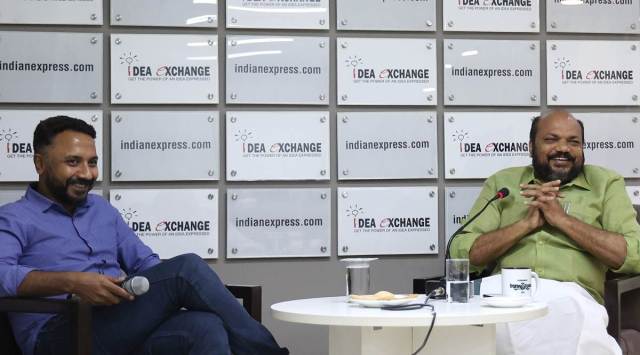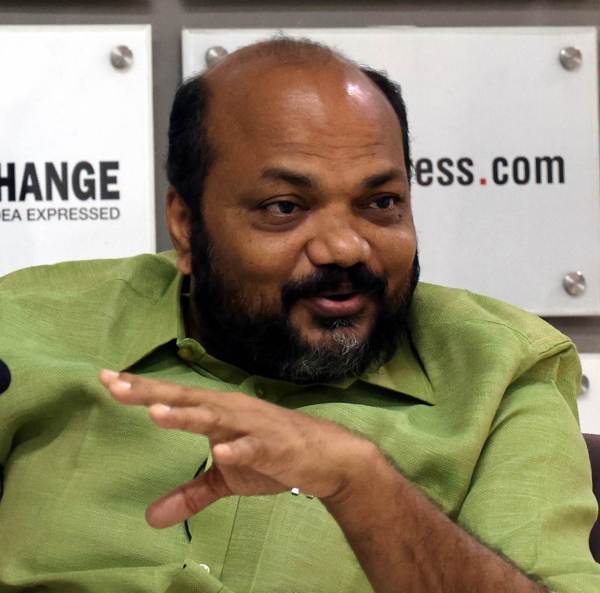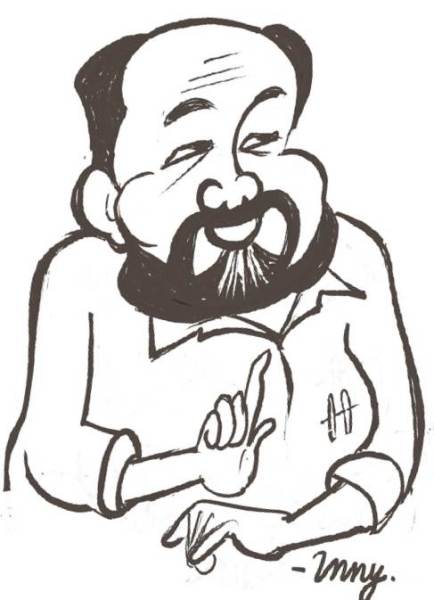P Rajeeve at Idea Exchange: ‘Work-from-home to work-from-Kerala, it has peace and you can eat anything here’
Elevated to the CPI(M) central committee last month, P Rajeeve — who’s been a vocal Rajya Sabha MP from 2009-15, and has experienced both the UPA government and the BJP in power — is one of the prominent second-line faces of the party in Kerala.
 P Rajeeve (right), Minister of Law, Industries and Coir, Kerala, with Manoj CG. Renuka Puri
P Rajeeve (right), Minister of Law, Industries and Coir, Kerala, with Manoj CG. Renuka PuriKerala Minister for Law, Industries and Coir, P Rajeeve talks about K-Rail project, strengthening infrastructure, Centre-state relations and why investors should head to Kerala. This session was moderated by MANOJ CG, Associate Editor, The Indian Express
Manoj CG: The CPM has been opposing the bullet-train project, and the south-north corridor proposed by the Oommen Chandy government. So, why is the Pinarayi government insisting on going ahead with the K-Rail project?
That is because it is the need of the day. K-Rail is an essential component of Kerala’s development and is needed to strengthen its infrastructure. We have certain shortcomings, particularly in infrastructure development. The widening of our national highway project had been pending for three-four decades, but the National Highway Authority of India (NHAI) decided to drop it (because of land acquisition issues; and this was restarted under the Pinarayi government in its first term). The width of the national highways across the country, according to the NHAI standard is 60m, while we reached a consensus on 45m. We are also trying to develop the state’s water transport system, a project that may be completed by 2023. K-Rail is a semi-high-speed rail system, the detailed project report (DPR) of which is already prepared, and the opposition to it is politically motivated. The Metro man (E Sreedharan) has mentioned that we are taking JICA (Japan International Cooperation Agency) loan, with certain conditions, but in 2009, the Delhi Metro was the first to be built with JICA loan.
 ‘Not only K-Rail, we are providing free internet service, K-Fon, which will ensure high-speed connectivity, so women can work from home. We will provide co-working spaces in villages where they can go and work after finishing their housework’
‘Not only K-Rail, we are providing free internet service, K-Fon, which will ensure high-speed connectivity, so women can work from home. We will provide co-working spaces in villages where they can go and work after finishing their housework’
Amrith Lal: One big concern about K-Rail is the environment. What about our understanding of environmental costs from the 2018 and 2019 floods? From where will we raise all the raw material for constructing embankments?
The DPR has incorporated these issues. In fact, this is a good project to reduce the carbon emission of greenhouse gases, compared to national highways or other transport systems. In the country’s per-capita usage of cars, Kerala figures in the top. We hope to reduce carbon emissions by introducing this rail system. As for the natural flow of rivers, we are implementing certain projects. We need projects like K-Rail for the future generation and the state’s development.
The K-Rail project is the need of the day. It’s essential for Kerala’s development. We have some shortcomings, such as in infrastructure development… The opposition to this project is politically motivated
Amrith Lal: K-Rail demands anywhere from Rs 65,000 crore to Rs 1.5 lakh crore in expenses, to save about five hours of speed. Is it commensurate with the kind of investment?
From 9 pm to five o’clock in the morning, the same K-Rail system will be used for row-in and row-out services for freight transport. All the big carriers of oils can be transported with the K-Rail system. The reduction of travel time for an individual is not the only part of K-Rail, freight transportation of finished goods and raw materials will give more dynamism to the economy.
Amrith Lal: With the emphasis on manufacturing, what kind of such industries would you wish to promote in the state?
We are trying to convert Kerala into the country’s investment destination for environmental, social and governance (ESG) efforts, with most of the investments directed towards it. Recently, we gave more than 2.5 lakh sq. ft of a building to Tata Elxsi. Now 40 per cent of their national workforce is working in Thiruvananthapuram. We signed an MoU with TCS to add 36-acre land to their campus in Kochi. In fact, the country’s first technopark is the Technopark in Thiruvananthapuram.
Second, we are trying to focus on electronics. In 1973, Kerala had established Keltron (Kerala State Electronics Development Corp. Ltd), just before South Korea entered the electronic sector. At the Asian Games in Delhi (1982), the traffic systems were controlled by Keltron, which also controlled the Kolkata Metro, India’s first Metro. But we couldn’t maintain it for long and are now trying to invest more into it. Also, our focus areas will include value-addition food processing, pharmaceuticals and medical devices.
Not only K-Rail, we are providing free internet service, K-Fon, which will ensure high-speed connectivity, so women can work from home. We will provide co-working spaces in villages where they can go and work after finishing their housework
Manoj CG: How do you compare your Parliament tenure, and experience of both the UPA government and the BJP in power, with Parliament now?
The country’s democratic system is facing serious challenges. I could talk (freely) in the Parliament back in the day because there was a person in the chair ready to hear it. Now the chair is not ready to look at a person from the Opposition. Most of the standing committees don’t work. I think there is no Deputy Speaker now, nobody seems to be bothered about that. Legislation policies are taking the Financial Bill route. The situation is alarming.
Unni Rajen Shankar: As for the limitation of the Kerala model, what do you need to do now?
We need to strengthen the Kerala model’s advantages. From the earlier emphasis on the right to education, we’ll now focus on the right to quality education, especially higher education, and strengthen the linkages between academia and industry. We’ll focus on the right to quality healthcare for all citizens irrespective of their financial position. Now, liver and organ transplantation are done in government and district hospitals and we have invested more in the superspecialty sector. We will invest more in agriculture, industry and the service sector.
 The WCC representatives demanded not to publish (Hema Committee report)…it’s not mandatory for the government to publish it because it’s not under the Inquiry Act
The WCC representatives demanded not to publish (Hema Committee report)…it’s not mandatory for the government to publish it because it’s not under the Inquiry Act
Unni Rajen Shankar: A recurring theme in that narrative is the baggage of militant trade unions and hartals. How do you tackle that? People are fearful even now to invest in Kerala.
Anybody can start an industry in Kerala, but they should follow the existing rules and laws. If any clauses in this law are irrelevant, impractical or outdated, we are ready to have a discussion and rectify that, if needed. Kerala’s cost of living and wages are very high. If you speak of militant trade unionism or loss of manhours, let me speak of another state, where an iPhone factory was attacked, and the loss amounted to more than Rs 400 crore. In yet another incident in Warangal district (of Telangana), following a dispute, the general manager of a company was killed by a militant group. These types of things don’t happen in Kerala. There may be some isolated issues but we are trying to rectify them.
The WCC representatives demanded not to publish (Hema Committee report)…it’s not mandatory for the government to publish it because it’s not under the Inquiry Act
Manoj CG: Your government recently sent a team to Gujarat to learn about the dashboard system which enables the CM to access data from all e-related applications. Is the Kerala model now learning from the Gujarat model?
On the national e-governance service delivery assessment index, prepared by the Centre, Kerala is No.1, Gujarat is not even in the top 10. And the first seven states on the list are ruled by non-BJP governments. Kerala was the first in the country to establish a digital university. I, as a minister, also have a dashboard for monitoring day-to-day activities. They (Gujarat) said their dashboard system is very good, even the PM said so to the CM (Pinarayi Vijayan), though theirs is developed by NIC (National Informatics Centre), on which we also depend. If it’s better than ours, it is our duty to look into the advantages of their dashboard, so our chief secretary had gone there. But a few months ago, the Gujarat Education Secretary came to study the Kerala education system. But that was not reported in the media.
Manoj CG: Tamil Nadu passed an anti-NEET Bill, and another Bill to take away the power of appointing vice-chancellors from the governor. Your government also had run-ins on a similar issue. Do you see a trend in the increasing Centre-state tensions?
In Tamil Nadu and Kerala, there was some conflict between the governor and elected governments. Our Constitution stands on the principles of federalism, secularism and democracy. All of these are under attack now. Now, no state has the power to change the tax structure after implementing GST. They (Centre) don’t give more freedom to the states in taking loans. The Governor has no power to reserve or defer a Bill passed by a legislator. All of these are weakening the country’s federal structure.
Tanushree Ghosh: Kerala has a vibrant film industry, but in recent times, there have been some high-profile cases of sexual abuse. Is there a systemic problem? As the law minister, how will you address it?
We had constituted a committee earlier, we have got its report and are working on the committee’s recommendation. We want to frame legislation to protect the dignity of women in the film industry. There were certain incidents. Maybe this happens in other parts of the country too, but in Kerala, it’s a good sign that female artistes have shown the courage to come forward. Our government stands with the victims of these incidents. We have constituted a special team to investigate these matters and are also trying to make a mechanism in the film industry, in accordance with the law.
Amrith Lal: The Justice Hema Committee, which investigated these cases in the film industry, submitted its report. What’s preventing the government from making it public?
I had a meeting with the WCC (Women in Cinema Collective) representatives. They themselves demanded not to publish this. It is not mandatory for the government to publish the report because it’s not under the Commission of Inquiry Act. We have taken the committee’s recommendations, the law department and my ministry have examined them, and given it to the cultural department, which is working to implement them. I think we can legislate a new Act to address all these issues.
Manoj CG: At the party congress, you reportedly spoke strongly against any alliance with the Congress. But you entered into an alliance with them in West Bengal, you’re part of a Congress-led alliance in Assam, and of the DMK-led alliance. So, what is the sanctity of this party congress resolution/line?
Our position is very clear, that is to isolate the BJP, because the BJP is a danger to the country, to our democratic system. But Opposition parties’ alliance with the Congress is actually diluting this position. We have witnessed what the Congress-RJD alliance did in Bihar. What is their position against the BJP? They’re taking a soft Hindutva stand. We can’t defeat Hindutva with a soft Hindutva stance. But our position is to defeat the BJP, by pooling in all anti-BJP votes at election time, etc. That’s crystal clear in the political resolution, but no alliance with the Congress.
Aanchal Magazine: The government has announced packages for MSMEs. What has been the impact during Covid, and how would you support the distressed MSMEs going forward?
Irrespective of Covid, we have established a high number of MSMEs this year. Kerala has big houses of about 3,000-4,000 sq ft, while only 600-700 sq ft of those are used; we are trying to utilise the rest of the house as a small (work) unit. Second, Kerala’s housewives are among the most educated housewives in the world. They have MBA, MCom, MSc degrees but are simply sitting at home. That is a national waste. Five or 10 years after they have had children, women have enough time on their hands, so they can upscale their skills and work from home or from spaces near their homes. We are forming a platform, and have signed MoUs with foreign companies. We are providing free internet service, K-Fon, as well as providing co-working spaces in the villages, for women to work from there after finishing their housework for the day.
Tanushree Ghosh: With the rise of Hindutva politics in Karnataka, most start-ups and the IT industry are looking at Tamil Nadu as their next destination. Why not Kerala?
We’re not competing with Tamil Nadu or any other state, but are trying to exploit our potential to attract more investments. In Ernakulam, we have a start-up ecosystem that’s No.1 in South Asia. We are establishing start-ups not only in the IT sector, but also in the manufacturing and agro-based sectors. Today, work-from-home is the new culture. We are trying to convert work-from-home into ‘work-from-Kerala’. Kerala has a very peaceful atmosphere, there is social and communal harmony. You can eat anything here; it has a good climate and natural beauty. Anyone can come to Kerala, and work for three-four months from your hotel/resort. Work tourism might be our next big thing.
Harish Damodaran: Today when there’s a crisis because of communal incidents in Karnataka, why can’t you project local software companies? You also mentioned women dropping out of the labour force, what’s happening to our traditional industries like coir and cashew, which employ a lot of women?
Kerala has a speciality in the software sector, too. We have implemented free software for the first time in e-governance and the educational system. In the traditional sector, the last government had spent more than Rs 1,200 crore in the coir sector. Now, we have decided to constitute a committee to examine the issues of productivity, etc., and formulate a new policy to strengthen the sector.
Pranav Mukul: There have been several cases of big start-ups, for want of capital, moving out of Kerala. Byju’s moved to Bengaluru, another Kochi-based fintech start-up moved out in 2018. What is being done to keep the start-ups, those founded in Kerala, from leaving the state?
Some company start-ups have moved to Bengaluru to get more funding. We are working on a mechanism. I think the new scenario would be helpful for our big start-up mechanism which is facing difficulties in scaling up.
Newsletter | Click to get the day’s best explainers in your inbox
Muzamil Jaleel: You said in Kerala people can eat whatever they want and the atmosphere is peaceful. But there are tensions in the neighbourhood. What’s the impact inside Kerala? Do you think there is any chance that Kerala might go the West Bengal way, considering the highest number of RSS shakhas are in Kerala?
The highest number of RSS shakhas have been in Kerala since decades but they could not go forward politically because of the Left’s interventions. In the last Assembly, they (the BJP) won one seat, and this time, the people of Kerala closed their account. For the first time in history, we got a second term. The Congress and BJP actually joined hands, along with the majority of the media, against the Left in Kerala. The PM said, ‘the Left is only in one corner, it is a very dangerous ideology.
We should defeat them’. That’s the strength of the Left. Communists had defeated fascism in the Soviet Union. From this corner of Kerala, we will defeat the fascist government.
Amrith Lal: The LDF manifesto talks a lot about women’s emancipation. But when it comes to politics, in (CPM) party positions, in the number of tickets given, there are very few women candidates. So, why is there this contradiction?
Women’s representation in our state and party committees have improved. We have three women ministers. It is low but an improvement from the last ministry. There are no women MLAs from the Congress in this Assembly. There is only one woman MLA from the UDF in this Assembly. Within a short span, women will get their proper representation in our party committees.
Why P Rajeeve
Elevated to the CPI(M) central committee last month, P Rajeeve — who’s been a vocal Rajya Sabha MP from 2009-15, and has experienced both the UPA government and the BJP in power — is one of the prominent second-line faces of the party in Kerala.
With the Pinarayi Vijayan government’s aim and focus to strengthen the Kerala model of development, this first-time minister has launched a number of initiatives. But the challenge remains.
He has a tough job at hand, to turn around loss-making PSUs, transition Kerala — known for its aggressive trade unionism — as an attractive investment destination and give a boost to the start-up ecosystem.





- 01
- 02
- 03
- 04
- 05


























